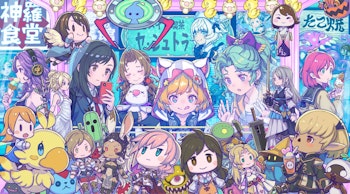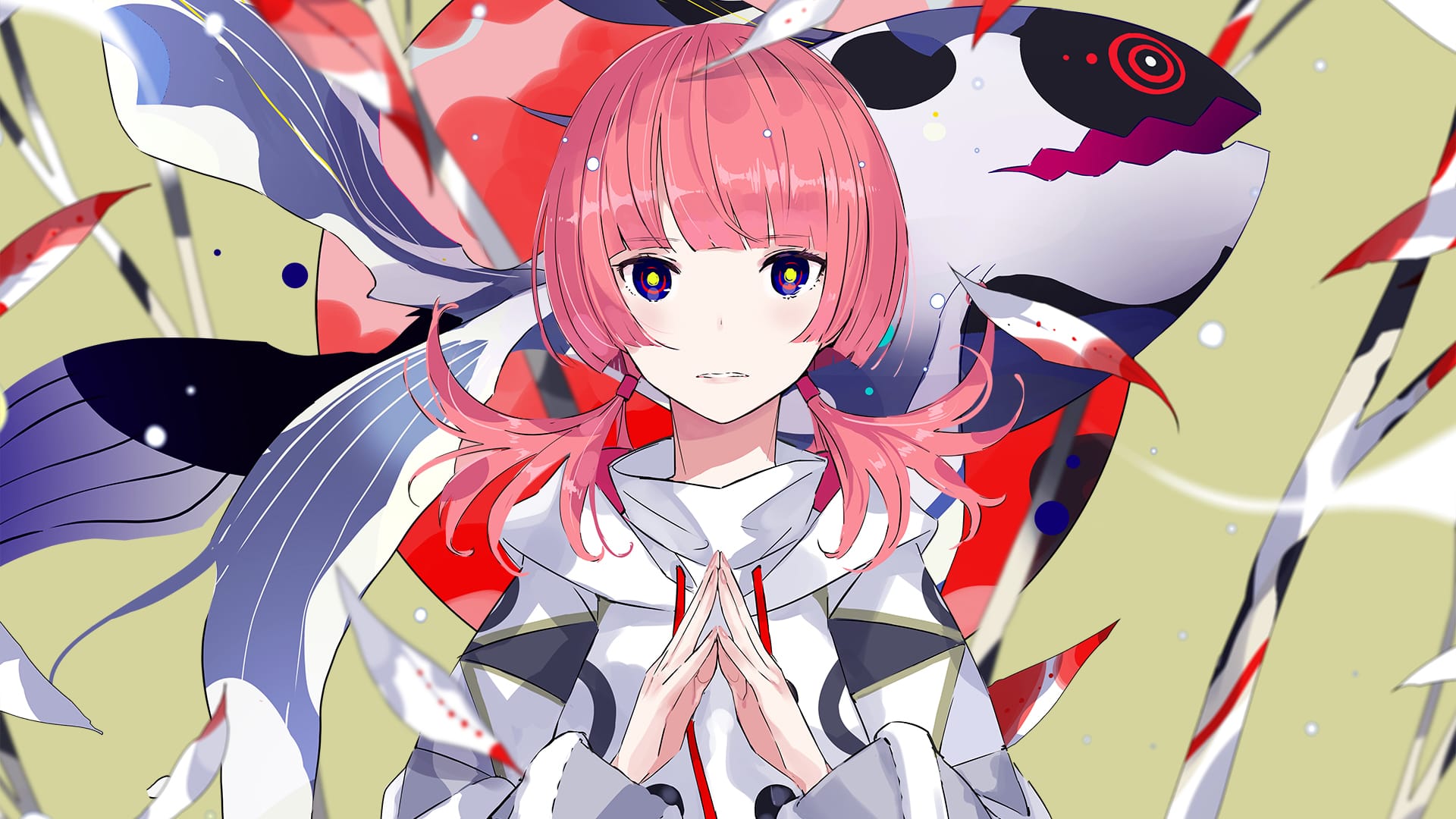
Despite existing as a virtual artist, KAF deals with a very tangible schedule. When the 21-year-old singer catches up with scrmbl over a video call, she’s just returned from a quick trip to Singapore where she performed at Anime Festival Asia, one of her first live sets outside of Japan.
“I got to share both my live performance and talk stage with [fellow KAMITSUBAKI artist] Isekaijoucho, and seeing the massive reaction from the audience throughout was such a fresh feeling to me,” she says on a Monday night. Still, despite the opportunity, the chance to actually take in the city eluded her.
“Actually not at all,” KAF says with a laugh when asked if she could explore Singapore at all. “I didn’t really have too much time…” That’s not surprising given the year she’s had.
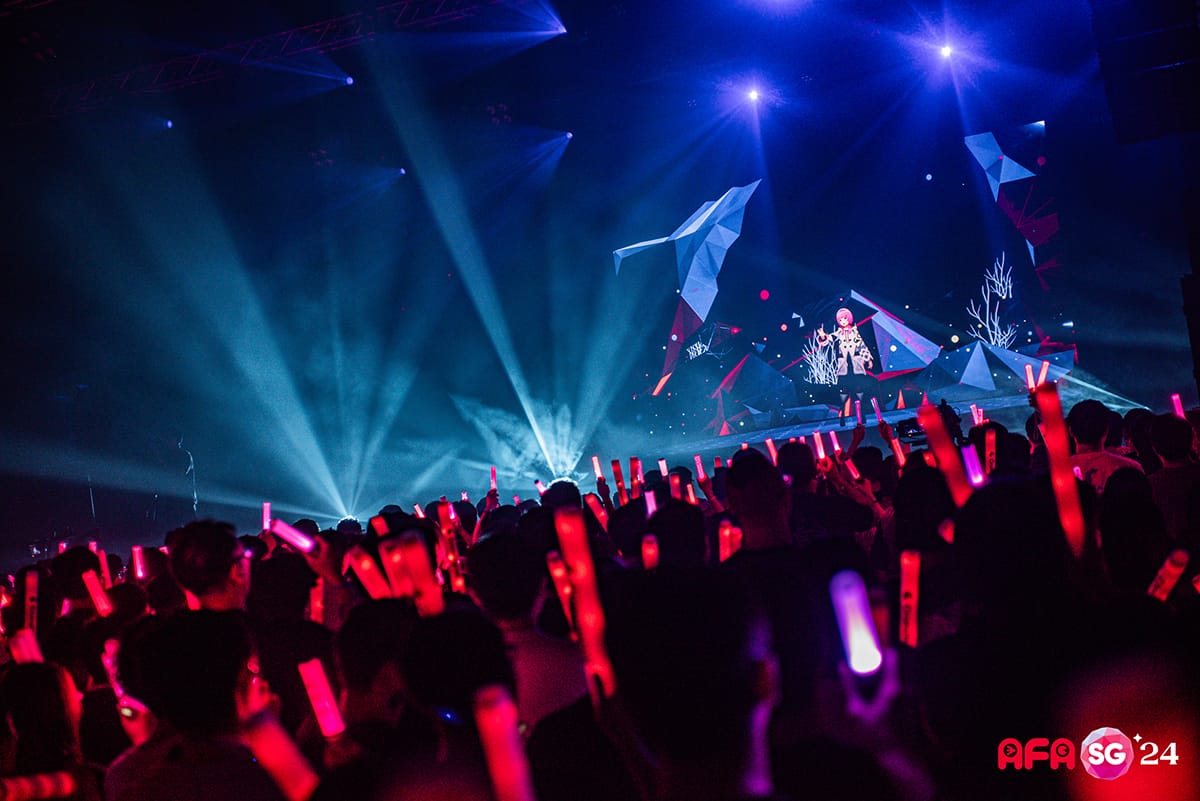
KAF first started sharing music on her YouTube channel in 2018, releasing uptempo and dramatic numbers using a digital avatar. She became one of the first “virtual artists” to gain momentum in Japan, standing out for focusing on music rather than being a digi-influencer like many Virtual YouTubers then nascent in the country. She focused on her word, whether through original numbers or covers, while also collaborating with an eclectic set of creators in Japan to reveal new angles to her artistry.
In 2024, she’s been particularly busy. KAF headlined a solo show at Tokyo’s Yoyogi National Gymnasium, becoming one of the first virtual acts to sell-out an arena show. She released a solo EP at the start of the summer, and shared a trickle of collaborative singles over the course of the year. She also unveiled a new persona of sorts called KAIKA, a project featuring songs entirely written by her.
There were more live shows in the back end, including the Singapore jaunt, and this week her fourth album Fable arrives, signaling a new era for KAF.
“Until and including my third album, I'd been working alongside producer Kanzaki Iori almost exclusively on each song,” KAF says, but notes that they are no longer involved in the process. “This time, however, it was a little different. Nearly every song sees a different producer handling it, so I had a lot more time facing my voice on my own.”
Fable marks an important shift in KAF’s career, finding her challenging a wider variety of sonic styles while also exploring new singing deliveries. Full disclosure: I help in creating English-language press materials for KAF, but when the opportunity to chat with her about the album, KAIKA, virtual reality and much more, I decided to give it a go for scrmbl. The following interview has been edited for length and clarity.
scrmbl: You’ve been extremely busy this year. Since 2024 is almost over, what are your favorite personal memories?
KAF: That's a tough one. In January I had my live show at Yoyogi National Arena – which left a massive impression on me, getting to show the audience so many different sides to KAF, to me. Whether through the more realistic Virtual Being KAF or presenting the version of me creating my own songs with KAIKA, it was the starting point for so many new things. On top of that, with the group I’m in V.W.P we had the recordings for our upcoming anime series, as well as our virtual stage play. It was a year full of many new experiences. I think if I were asked for my favorite moment, I wouldn't be able to give just one – that's the kind of year it was.
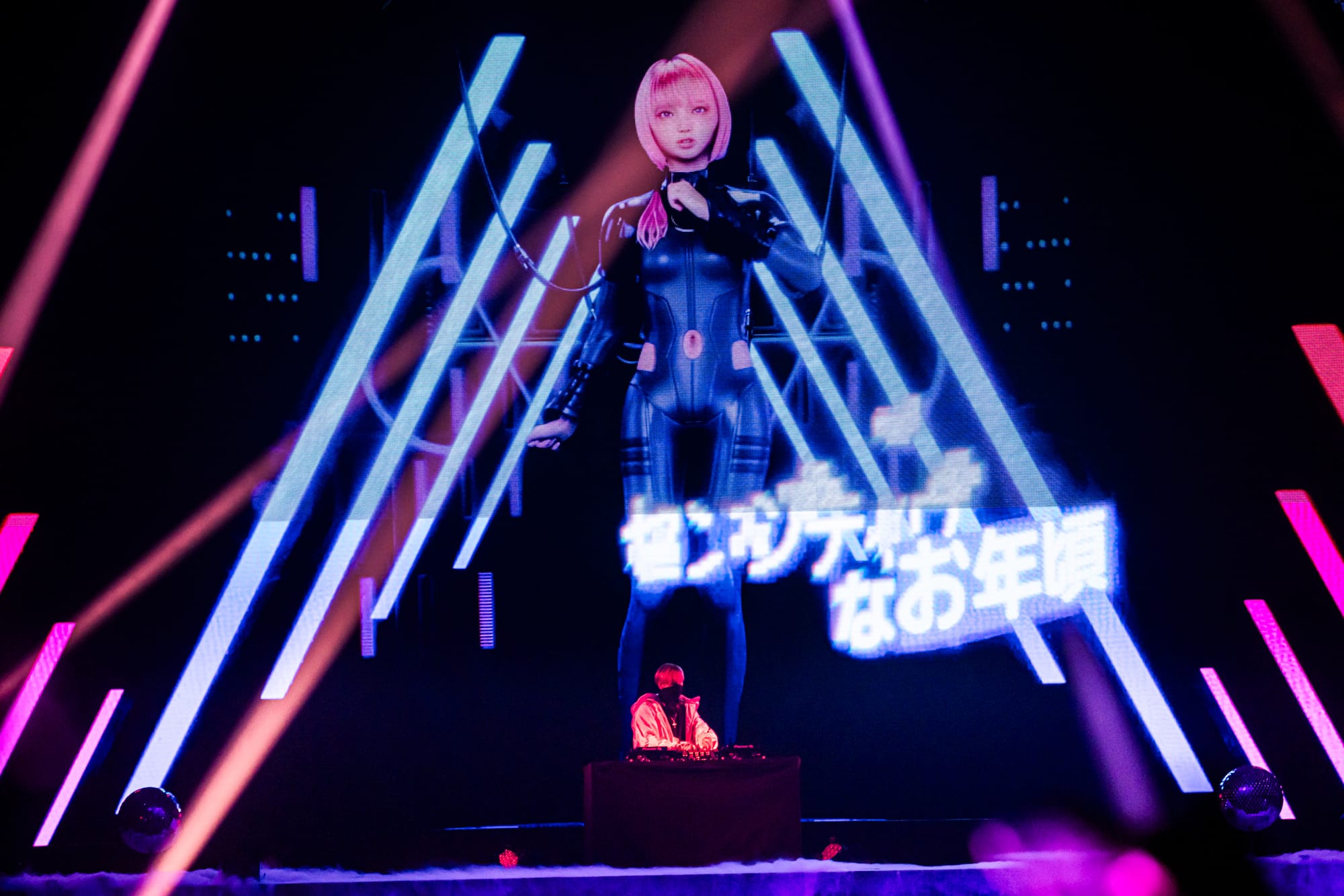
It seems like you are super busy. A question I like to ask artists who are really busy is how they avoid burnout. What do you do to stay in the right mental state?
I tend to... cut vegetables. [laughs] I find that helps fade away the stress.
What’s the best vegetable to cut to relieve stress?
Onion...?
See, I imagine the fact it would make you cry would complicate the stress.
That's part of the charm! [laughs]
When did you start doing this to deal with stress?
When I started living on my own. I had to start cooking for myself — that's when I discovered the mental healing power of cutting vegetables.
When did you start living alone?
It would have been about three years ago, right after graduating high school.
It’s always a big moment when anyone has to live by themselves for the first time. If you could go back three years and talk to that KAF, what would you tell her?
The me of three years ago was stumped about whether I should buy a bicycle or roller skates. In the end, I wound up buying roller skates. To that past version of me, I would say “you absolutely should have just bought a bicycle.”
Why is that?
[laughs] If I had a bicycle, there are so many more places I could have gone.
I could ask you questions like this all day, but let’s chat about your new album Fable. When did you begin working on it?
If it's getting into specifics... the first song I would have recorded was “Gestalt.” When was that? It would have been just after the Yoyogi show... so around February or March. I went into each and every song trying to bring as much energy as possible!
What changed in the creation of this album?
Until and including my third album, I'd been working alongside Kanzaki Iori almost exclusively on each song. We'd go into the studio together, and it would be a back-and-forth process of "this part you should try singing like this,"or "if we tried this here, maybe it would sound more impactful." This time, however, it was a little different. Nearly every song sees a different producer handling it, so I had a lot more time facing my voice on my own. That was probably the biggest difference.
How did you feel having to confront your voice like that? It sounds intimidating to me.
Towards the end of it all, I felt like I'd been listening to my own voice for so long that I could honestly go crazy. [laughs]
What songs were particularly challenging to make?
The song "Who" is quite an in-your-face song, it's got a very band-esque feel to it, with a lot of low parts and a melody that jumps all over the place, it was probably the most difficult to record. [laughs] I definitely had to sing it over and over again to overcome the challenge.
On the song "Carpe Diem," at the very end has this line "Live on..." that is repeated over and over, this part was somewhere that I felt I really had to pour all my emotions into. I didn't want to focus on anything else, just repeating those words in my head. When I got that all out, I was even a little surprised.
What else surprised you?
The song "Swimmer", which was made by the artist suisoh, and when she came to the studio for vocal direction, she sat down and listened to me do a run-through of the song. She said something along the lines of "Oh, the lyrics are presenting these emotions so you're singing like that during those parts, right?" and it was so exactly what I was feeling that I couldn't help but be surprised that this song had been made for me.
While creating Fable, what did you learn? Whether musically or about yourself?
If it's surrounding my own voice, I think with "Gestalt" where I had to bring the maximum amount of tension to my vocal performance, the song "Replaceable Goodbye" was the exact opposite. If this was the me of not too long ago, and the things I could do when looking at releasing an album every few years, it really feels like my range is increasing in regards to my vocal performances.
What do you hope listeners get out of the album?
The most important thing to me is definitely that people should take their own message from it, but as the title Fable hints at, I want to make sure that it feels like an entire world — an entire narrative is contained within the album — filled with various regions, dialects, and stories.
What are some of your personal favorite stories? The ones that have really stuck with you?
My favorite is definitely “The Happy Prince,” when I was younger I just found myself liking it. The French children’s series “Penelope” was another favorite.
We’ve talked a bit about how busy you are this year, and one of the projects you’ve started and really leaned into is the persona of KAIKA. When did you want to begin this project, or persona?
For a while now I’ve been making music on my own, and realistically more so than a feeling of “I want to become KAIKA,” the opportunity was presented to me by my producer, and it was more like “I want to share all the things that being KAF has almost held me back from.” Almost like being reborn, becoming something else, while at the same time celebrating KAF. I felt like in order to share what I really held dear to myself, I’d have to do something different. That’s what ultimately birthed KAIKA.
When did you first start writing your own songs?
From around age 15.
Why did you decide that now is the time you want to share them?
It really felt like they were songs made for me, by me, and when the idea was floated by my producer — I really felt like it was something I wanted to do. Up until now the shape I’ve taken in front of everyone is of course as KAF — I’ve taken on many forms as KAF, but it’s always been KAF. So I had a very real feeling, almost a curiosity of how people would react to something different. I was also scared of what I would do if people didn’t react well, but it was something I had to overcome.
Something I find interesting about KAIKA is that it’s definitely more you, I can pick up on the personal feelings, yet at the same time you are still hiding a bit — it’s your art, but you aren’t putting your physical self out there. You are still obscured. Have you ever considered fully facing the world?
Honestly, I can’t say with certainty, but really, with the removal of that front-facing persona, I sometimes do have to wonder what it would be like if things were flipped and I was in front of people, but up until now I’ve always been able to enjoy that sense of protection being behind an avatar presents. I've been able to do normal things like go to school or walk around thanks to this protection. I can’t speak for the future and forever onwards, but it’s something I think anyone would be curious about.
What have been challenges so far as KAIKA?
The songs I’ve made up until now, I’ve always felt a sense of excitement towards, with the exception of one. "KAIKA." It’s the one song I made after presenting KAIKA to the world, and it’s the first song I’ve had to think about the reception of when creating it. It’s very personal, and I felt like a lot of it came from inside, so how that would be perceived was a big question to me.
I’ve been struck by how earnest you are with the songs you release as KAIKA. Like a song like “Teddy Bear” touches on something we talked about earlier — living alone for the first time, which can be a topic that leaves one emotionally vulnerable. Have you ever had doubts about putting yourself out there?
Hmm… well the songs I’ve made, I honestly really do love — so I really do have confidence about them. My songs, KAIKA’s songs, I really do think they’re good and I have confidence in them.
Who inspires you as a songwriter?
I really do listen to a lot of music, so I take a lot of influence from all around — but when it comes to lyrics, I think the band Quruli is a big influence, as are the songs I’ve covered up until now. I think those are where I take the most influence from.
What’s your favorite Quruli song off the top of your head?
The first one that comes to mind is “Sayonara Regret."
Shifting gears a bit, I wanted to talk about something present in both KAF and KAIKA’s work, which is an interest in blurring the lines between the real world and the digital. First off…do you remember the first time you ever used the internet?
I do! I was on the official Disney website, and they had a Rapunzel game… you would climb up and collect items. I would play it every day. I would have been about nine years old.
What’s your relationship with the internet today?
Since beginning this lifestyle, with everyone’s support, I do tend to find myself using the internet a lot. Though to me it’s mostly a tool for communication.
What excites you about being a virtual artist?
To me the virtual world is, of course, with my virtual body, doing anything in this world you can really see that it was all built from zero. Whether that’s the sky or your own shadow — everyone without doing anything on their own can exist in this virtual world. When I stand on my own on the stage, it’s thanks to the collective genius of a group and it makes you feel like you’re not truly alone. The concept of building an entirely new world from scratch — it’s something that requires a true level of dedication.
On the flip side, what scares you about the virtual?
Right now, there are a lot of people who have become enamored with virtual worlds. It used to be a thing where people would avoid things automatically if they were virtual. “It’s just a drawing, there’s no heart to this fiction.” It made me think about a lot. It wasn’t so much scary as it was a little sad.
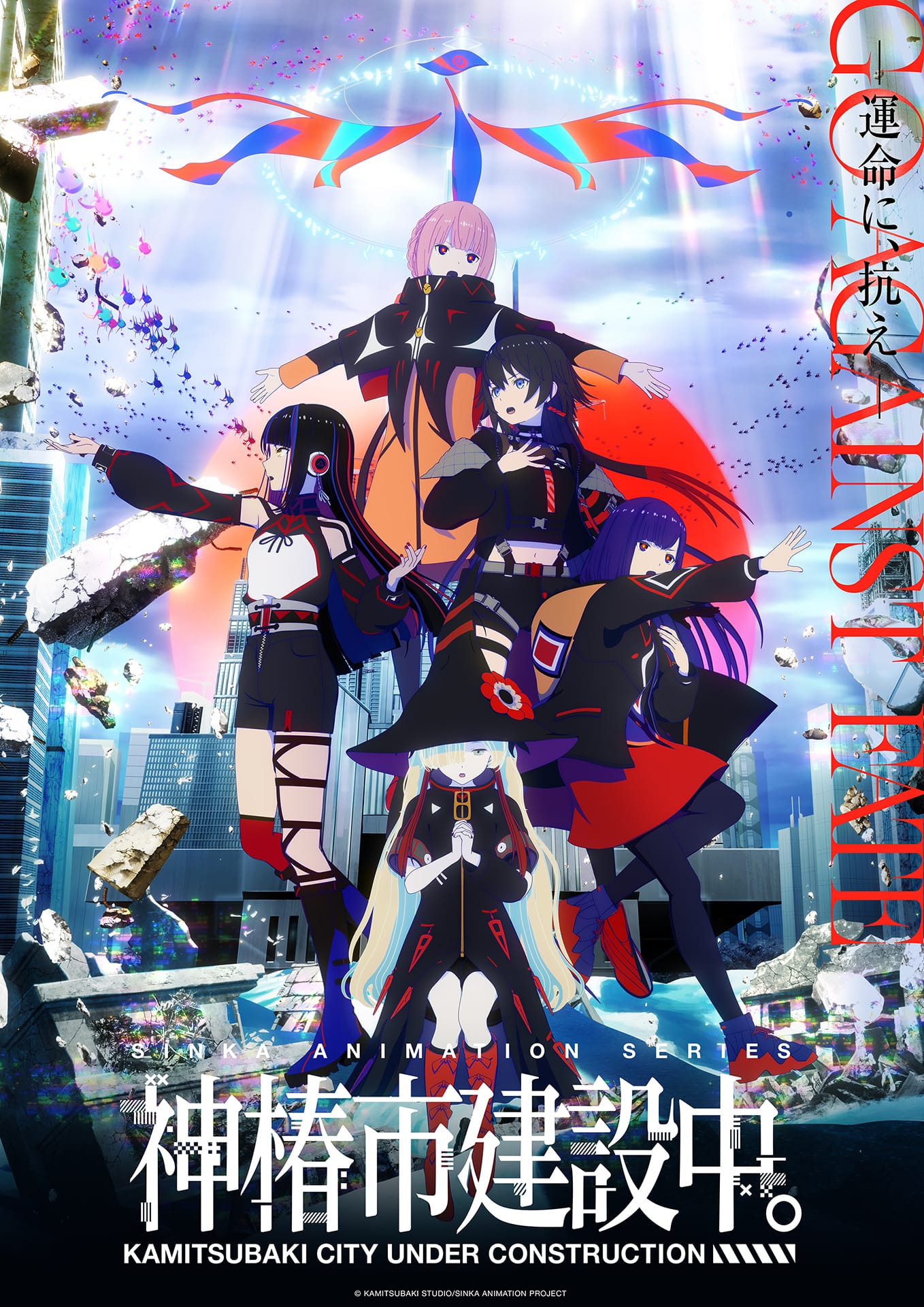
Of course, the album is out at the end of December, but I was curious about what comes next. What are you excited about moving forward?
Next year, I mentioned it a little earlier — but we’ve got the upcoming anime series KAMITSUBAKI CITY UNDER CONSTRUCTION. That’s something I’m very excited about. I want to make a lot of new music, too.
Any final messages to readers?
Thank you to all of you who are reading this! Thank you for listening to me sing — whether it be in English or in Japanese, I hope to make all sorts of new music! If I can ask for anything, please connect me to an English teacher!
Oh, that’s actually something I’m curious about, how was the experience of singing in English on “Answer?”
Since “Answer” was originally a Japanese song, matching the rhythm with English lyrics, that was the toughest part. The feeling of challenging something I didn’t think I could do was a lot of fun. I’d love to make another English song!
KAF's 4th full-length album, Fable, hits major digital platforms and Bandcamp on December 25, 2024.







